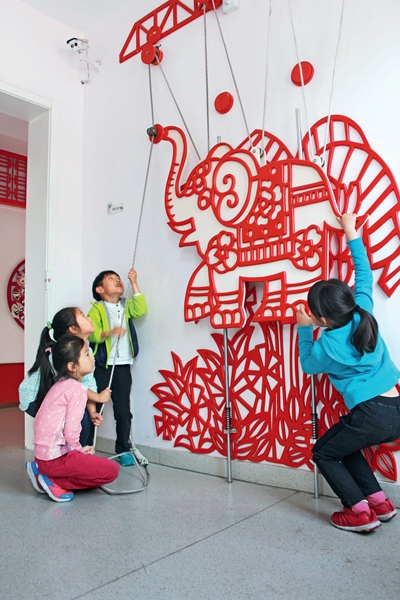Science learning starts in childhood
- By Liu Sufang and Zhou Lin
 0 Comment(s)
0 Comment(s) Print
Print E-mail China Today, June 20, 2017
E-mail China Today, June 20, 2017
|
School children operate an elephant puppet and get it to move its trunk by pulling strings that activate block and tackle pulleys. [Photo/China Today] |
A model car in a kindergarten in Beijing's Haidian District clearly mystifies and fascinates a class of hawk-eyed children. The rays of sun set the car moving. Boys and girls alike jostle to take a good look at this solar-powered auto. Some lie on the ground and peer beneath it to check they aren't being fooled. The class as a whole peppers the lecturer with questions. This is a science class at Middle Class 2 at the Chinese Academy of Sciences (CAS) No. 3 Kindergarten. The lecturer, Jin Kui, is director of the SC2 research division and doctoral supervisor of the National Laboratory for Superconductivity (NLSC) at the CAS Institute of Physics. Jin Kui was selected by China's "Recruitment Program of Global Doctors" and the institute's "One Hundred Talent Program" and is a CAS No.3 kindergarten parent advisor. His son Jin Chuzi attends this kindergarten.
Science education made fun
"Children are insatiably curious, because it's by asking questions that they learn. That's why it's so important to direct their attention to multiple aspects of their immediate environment and show how they relate to fundamental principles of physics," Jin Kui said.
Bearing in mind the way children's minds work and how best to capture their interest, Jin wrote a fairytale with a scientific edge. He also devised games to teach children about renewable energy sources like solar and wind power.
Jin put a riddle to the children to get the ball rolling: "An old man with a rosy face gets up early and is never late for work. Who is he?" Before he had even finished the children called out the answer: "The sun!"
On being asked what benefits the sun brings people, the children put up their hands, vying to answer. "Because the sun sterilizes things; it protects us from viruses!" "Plants need sunshine to grow!" "In summer, the sun makes me so hot I need to eat ice-cream to cool down!"
"Children's answers always take us by surprise," Jin said, "but their understanding and observations are often far beyond our expectations."
Having captured the children's attention, Jin began his story. When it reached the point where he could elaborate on wind power generation, he presented a model fan to the class. This custom-made teaching aid was in the form of a miniature wind turbine. With it Jin demonstrated how energy can be generated through wind as well as at power stations. He showed how rotating the blades of the mini-turbine could illuminate a light bulb. The kids were fascinated, and all wanted to have a go.
Jin then connected the model to a multimeter. The children saw how blowing the miniature wind turbine round registered the electric current it generated. They all wanted a go to see who could blow the hardest. In the process they saw how keeping the turbine revolving sustained the electrical current.
Striking while the iron was still hot, Jin asked them, "Since wind generates electricity, can sun?" The children all replied in the negative, vigorously shaking their heads. Jin then produced another model – a chargeable dragonfly. The children thought it was beautiful, and admired its glittering wings. Then one of them spotted on its body a gleaming blue board – a solar panel.
The model car was the finale to this solar power spectacular. As Jin Kui observed, "The children now understand the concept of renewable energy."
Parent advisor on science education
The year 2007 highlighted the importance of science education in the 21st century. That year the State Council promulgated The Outline of National Scheme for Scientific Literacy.
The CAS No. 3 Kindergarten is both a "Happy Science" base for children's science education and also the CAS Institute of Psychology center for children's learning and development. The kindergarten's unique parental resources are integral to promoting the children's science education. Their parents mainly work in CAS subordinate institutes, such as the Institute of Physics, Institute of Chemistry, Institute of Botany and many others. Equipped with abundant professional knowledge in their fields, these parents know exactly how to make science education both accessible and enjoyable to children. The compelling scientific experiments they devise are designed to enchant children with scientific phenomena. The parent advisor program has thus greatly broadened their scientific horizons.






